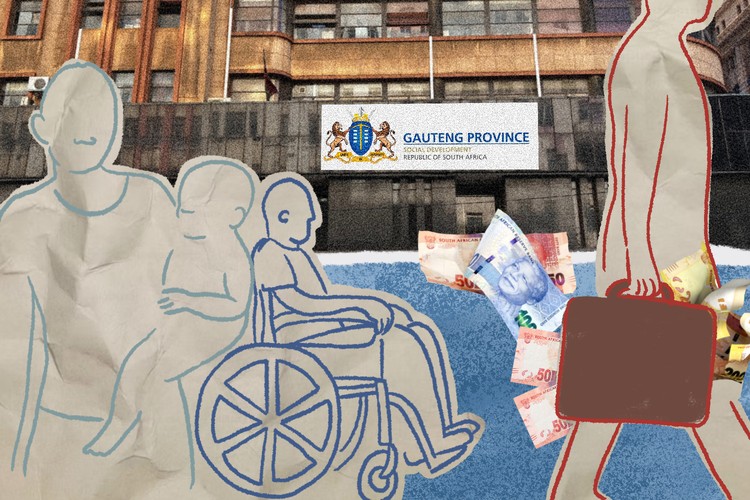
12 July 2024
Mismanagement at the Gauteng Department of Social Development has caused huge delays in funding for non-profit organisations that help vulnerable people. Illustration: Lisa Nelson
Thousands of food parcels meant for low-income households are gathering dust in Gauteng’s food banks, due to payment delays by the Gauteng Department of Social Development.
Food banks are run by non-profit organisations that have contracts with the department to distribute food parcels to beneficiaries. The food parcels are traditionally supplied to the food banks by companies appointed by the department through a tender process.
For the first nine months of the 2023/24 financial year, the food banks were out of stock because the department had experienced delays in its tender process to appoint supplier companies.
By September 2023, the tender process had been finalised, but the department decided not to award the tender because it did not make provision for seeds for people to grow their own vegetables, according to documents leaked to GroundUp.
Instead, the department decided to use emergency regulations to appoint 15 suppliers of food parcels in February 2024, spending a total of R22-million.
Deviations from usual tender procurement processes are allowed under certain circumstances, including in emergency situations. The department told its bid adjudication committee that “procurement by other means” was necessitated by the high rates of food insecurity in the province.
Seventeen companies were selected from the Central Supplier Database and asked for quotations, and 15 were awarded contracts.
The companies signed three-month contracts to supply thousands of food parcels to the province’s food banks.
But the food banks were only funded until the end of March 2024, when the financial year ended. So when the food banks received thousands of food parcels throughout April, they did not have funds to distribute them to beneficiaries.
GroundUp has seen internal documents from the department where additional funds were approved to pay food banks so that they could distribute the food parcels, but it appears this never happened.
Two food banks GroundUp spoke to said that they have thousands of food parcels piling up in their warehouses and that they have not received any funding from the department since the last financial year.
The department did not respond to our detailed questions, despite several follow-up attempts. However, the department recently posted a picture on Facebook of the new MEC for Social Development, Faith Mazibuko, visiting food banks, suggesting there are attempts to resolve issues facing the food programme.
The appointment of 15 suppliers without tender processes was one of several deviations from supply chain management processes by the department in the last few months of 2023/24, in a bid to spend its budget by the end of the financial year.
By September 2023 the department had only spent 37% of its budget for goods and services, which included food parcels and dignity packs.
In February, the department spent R159-million on 1.7-million dignity packs, once again not going through tender processes and using emergency regulations. Dignity packs are made up of sanitary pads and other feminine hygiene products, distributed mainly to schools.
Several of the companies appointed to provide food parcels were also contracted to supply dignity packs, according to documents seen by GroundUp, meaning that the companies benefitted more than once from the department’s deviations from tender processes.
Some also benefitted from the department’s December Festive Season food campaign, in which five companies were appointed to supply food, receiving between R5-million and R8-million each, according to documents leaked to GroundUp. In total, R37-million was spent on the campaign.
Pictures on the department’s social media pages from December 2023 show former MEC for Social Development Mbali Hlophe, Gauteng Premier Panyaza Lesufi, and the former Head of Department Matilda Gasela, handing out food parcels wearing Christmas hats.
Zain Abubaker, the owner of Pietermaritzurg-based Zain Brothers, which supplied food to Red Cross Soweto as part of the Festive Season Campaign, is also the owner of another company, Lateomark, which was one of the companies contracted in February to deliver food parcels to food banks.
Abubaker’s attorneys, responding to our written questions, denied that there were any links between these contracts, as Zain Brothers dealt directly with Red Cross South Africa and Lateomark dealt directly with the department.
LTC Holding, a logistics company involved in the supply of food parcels for the Festive Season programme, was also one of the companies selected by the department in February to supply food parcels to the food banks. LTC Holding did not respond to our questions.
The document approving the expenditure for the Festive Season campaign was signed off by the Head of Department Matilda Gasela and two other senior officials, including the Chief Financial Officer Johann Strauss.
Ithemba Labantu Development Centre, one of the other organisations in the campaign, told GroundUp they had been personally called by Gasela and invited to become part of the food programme. Asked further questions in writing, they said that it was “none of your business”.
The other organisations that received funding were Red Cross Soweto, Youth for Survival, The Healing Hands, and Life for You. They did not respond to our questions.